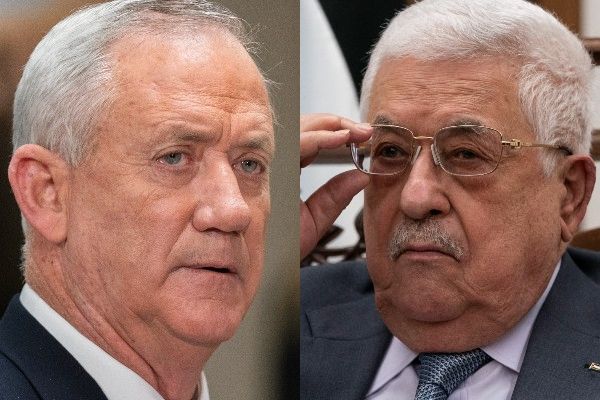Benny Gantz’s primary concern may lie with his political future and legacy, believing that brokering a peace deal with the Palestinians will cement his place in Israeli history.
By Lauren Marcus, World Israel News
Defense Minister Benny Gantz reportedly forced Palestinian Authority President Mahmoud Abbas into issuing a rare condemnation of Palestinian terror on the heels of a deadly shooting attack that left five people dead in central Israel on Tuesday.
Abbas typically holds off on issuing statements that would indicate a lack of support for Palestinians who murder Israeli civilians.
The PA’s pay-for-slay policy, which sees terrorists (and their families) receive salaries while incarcerated in Israeli prisons, speaks volumes about Abbas’s true convictions.
Gantz, a former IDF chief of staff, reportedly threatened Abbas with harsher restrictions for PA residents regarding work permits and visits to the Temple Mount during the month-long Ramadan holiday in order to force the PA leader to speak out against the attack.
But the question is: Why was Gantz so desperate for what he knew was an insincere condemnation from Abbas?
The answer may lie in the defense minister’s political ambitions and what he sees as his legacy.
Gantz has seen his dreams of becoming prime minister destroyed after his Blue and White party floundered in several inconclusive national elections followed by the collapse of a rotation deal that would have seen him become Israel’s premier. Perhaps he believes that the way to make a lasting impact on Israeli history is by brokering a peace deal with the Palestinians.
Gantz met with Abbas repeatedly over the last year, inviting the PA leader to his home in Rosh Ha’Ayin in December and traveling to Ramallah in August — becoming the first senior Israeli government official to meet with the leader on PA turf.
During one of those meetings, Hebrew-language media reported that Gantz told Abbas he wanted to become “the next Rabin,” speaking about the slain prime minister who ushered in the 1994 Oslo Accords.
“I believe in the two-state solution and believe it is the appropriate solution,” he reportedly told Abbas.
After the meeting, Gantz’s office released a laconic statement in response to reports about his remarks. The quotes were “not exact,” said a spokesperson, who refrained from commenting further.
Gantz has also said publicly that he supports Palestinians having their own state, though he’s been vague about the details of such an arrangement.
During a February 2022 security conference in Munich, Gantz said, “Eventually we will find ourselves in a two-entity solution in which we respect Palestinian sovereignty and governance, but we will be respected for our security needs.”
In an interview with Axios in December, former president Donald Trump said that Gantz was genuinely interested in securing a peace deal with the Palestinians, as opposed to former prime minister Benjamin Netanyahu, who was more reluctant to accept a potential agreement.




